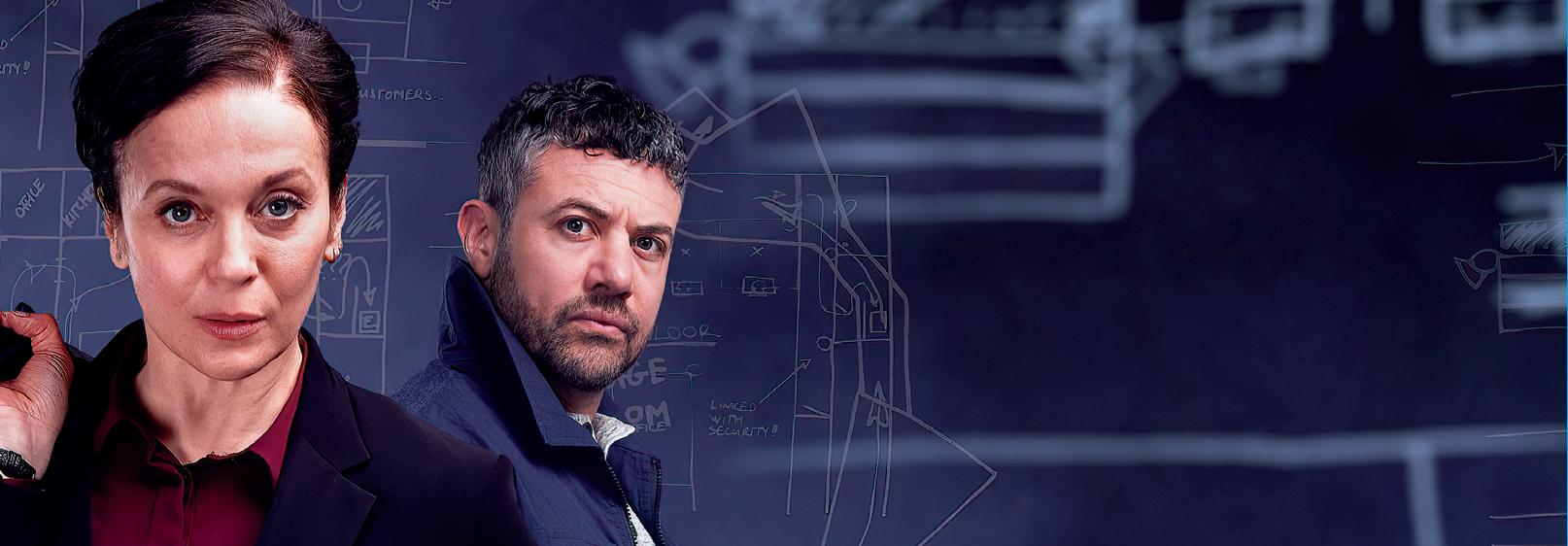
10 minute read
Riding the J-wave
Japan’s increasingly outward-looking scripted industry is looking to embrace international collaborations and take ‘J-drama’ around the world.
When asked to name successful Japanese TV exports, most people would probably think of anime series such as Demon Slayer and Attack on Titan, or cult hits such as Takeshi’s Castle, Ninja Warrior and Old Enough!
And while it would be fair to say that anime and unscripted formats still dominate content coming from the Land of the Rising Sun, its scripted content is quietly becoming a force on the international stage too.
J-dramas such as Nippon TV’s Mother and Netflix sci-fi thriller Alice in Borderland have attracted millions of viewers, while pubcaster NHK recently agreed to its first international scripted remake. The move will see South Korean prodco Big Ocean ENM adapt NHK’s 2010 romcom I’ll Still Love You Ten Years From Now for local audiences.
“NHK’s dramas have been selling well internationally, and we’ve always hoped to license more scripted formats. This deal will give us momentum to do more,” says Yonemura Yuko, NHK Enterprises’ general manager of content distribution.
Commissioners and buyers are increasingly opening their chequebooks for programming made by the best creatives working out of Japanese production hubs like Tokyo and Osaka.
It’s a far cry from the days when the island nation was largely considered a closed market by the international TV industry – hard to sell into and seemingly unconcerned with anything other than serving its own domestic audience.
“For a long time Japan has been a self-sufficient market and could generate enough revenue without going to the effort of international cooperation,” says Aratani Noriko, head of international content development at NHK, which operates two terrestrial and four satellite channels.
Yashiki Yotaro, NHK’s head of drama and entertainment production, says: “There was undeniably a time when it was difficult for foreign dramas to go worldwide because of subtitles and dubbing. In Japan, we used that as an excuse to give up trying to go worldwide.
“However, with the rise of streaming platforms, plus Korean and Turkish dramas becoming so popular around the world, there is more space and openness for foreign dramas. Squid Game proves that language can no longer be used as an excuse.”
With a national population close to 125 million, it’s hardly surprising that Japanese broadcasters didn’t feel the financial imperative to seek alternative revenue streams overseas.
The country has six major networks: TV Tokyo, TV Asahi, Fuji TV, TBS, Nippon TV and NHK, which is the only channel to be funded by a licence fee.
Netflix and Hulu – the latter owned and factors make Japanese series unique but relatable at the same time and I foresee more drama travelling globally.”

Established just over 70 years ago, Nippon TV has played an integral role in the rise of J-drama with international breakthrough hit Mother. Originally aired in 2010, it stars Yasuko Matsuyuki as an elementary school teacher who takes an abused pupil into her care.

Although Mother only ran for one season of 11 episodes, its influence was significant, becoming
The fierce competition of having six network TV stations makes Japan a unique place for drama and there are many competitions for new scriptwriters to compete in. All these multi-dimensional positive factors make Japanese series unique but relatable at the same time.
“



Sayako Aoki, Nippon TV

controlled by Nippon TV in Japan rather than Disney – are two of the biggest streamers operating in Japan, but a host of rival online platforms have sprung up, including U-Next, dTV, TVer and Paravi.
“The storytelling strength keeps evolving to adjust to the savvy audiences, with series having a much longer life than before on digital platforms,” says Sayako Aoki, head of scripted formats at Nippon TV.

“The fierce competition of having six network TV stations makes Japan a unique place for drama and there are many competitions for new scriptwriters to compete in. All these multi-dimensional positive the most adapted scripted format out of Asia, with seven local adaptations to date in Turkey, South Korea, Ukraine, Thailand, China, France and Spain.
“The story reached the emotions of the global audience with its thought-provoking universal theme,” says Aoki. “Furthermore, the Turkish version, titled Anne, was a record-breaking hit that was exported to almost all corners of the world, which was definitely a first for us.”
Emboldened by this success, Nippon TV has since created several scripted shows that have tapped into the international market.
Connected: The Homebound Detective, produced by Envision Entertainment, is the story of an agoraphobic young man who uses his computer skills to solve crimes without leaving his bedroom. It has been optioned for a US remake by ITV Studios-backed Tomorrow Studios. live-action and anime, each year in Japan over the past two years, with the commissioning balance now more even between scripted live-action and anime.”
“Connected was specifically designed to result in a number of localised versions, featuring diverse characters from different countries,” says Aoki.
In 2021, Netflix partnered with Tokyo Broadcasting System Television (TBS) to release two homegrown scripted projects globally: J-pop drama I Will Be Your Bloom and eco-themed drama Japan Sinks: People of Hope.
The collaboration was strengthened last year when Netflix, hoping to ride what it calls the “J-wave,” teamed up with TBS-owned prodco The Seven to make multiple original live-action titles to be streamed in 190 countries.
“There is a growing appetite for well-produced Japanese programming, both domestically and internationally, and together with The Seven, we’ll deliver our best shows and best stories to our members,” said Netflix last November.
,NN
r network Fox n: ns d for Line TV in TV will y Rebooting to elieve IP mined y a
In addition, Nippon TV drama Without Family has been adapted in Turkey by Istanbul-based prodco MF Yapim for free-to-air network Fox Turkey, while a version of Woman: My Life for My Children ran for three seasons in the same country and Abandoned was adapted for Line TV in Thailand.



At MipTV in April, Nippon TV will shop youth-skewing time travel comedy international buyers. Executives believe IP mined from Japan’s rich cultural history can inspire a new wave of original content for international audiences.

“There is a vast treasure chest of everlasting novels and mangas that are already appreciated by people around the world,” says Aoki. “There is a huge possibility in creating series based on those magnificent stories. Situations that may sound particular to a Japanese culture are actually understood by the global audience.” r international dy s Aoki. “There eries based on ions that ure are ecome a y re t accounted pan zon Prime ndemic, ear ed for content iants in st halved
Recent years have seen Japan become a key market for international streamers. According to London-based research firm Ampere Analysis, in 2019 live-action scripted content accounted for just 17% of commissioning in Japan by SVoD services Netflix, Disney+ and Amazon Prime Video. But following the Covid pandemic, that share rose sharply to 46% last year.

Interestingly, anime accounted for 65% of all original Japanese content commissioned by the streaming giants in 2019, although that figure had almost halved to 33% in 2022.
“Netflix continues to be the biggest international investor in Japanese scripted content overall,” says Alice Thorpe, a senior analyst at Ampere. “It has commissioned around 20 series and movies, in both a senior sioned both
Akira Morii, who produced both seasons of Alice ix, leads development and production at the label. It has access to a state-ofthe-art studio lot in Yokohama, which the streamer said will result in productions that are “best in
Akira Morii, who produced bo in Borderland for Netflix, leads d at the label. It has a the-art studio lot in said will class.”
“TBS Group has 10 studios at our headquarters ve more at Midoriyama Studio City in Yokohama, but they are only capable of TV production in Japan and not to the specs usually required from global OTT platforms,” says Fumi Nishibashi, manager of global business at TBS and director of business development at The has 10 studios a in Tokyo, plus five more at M not to plat globa and director of business d Se S ven
“A lot of elements, including script writing, pre-, post- and actual production, budget, tech specs and censorship are different from the ones for TV production in Japan. The new studio lot for The Seven is equipped for global requirements, thus very important for our future production abilities.”
“A lot of element writing, pre-, b and censor th producti new s Seven globa th t us o our abilit Roman T Times, wh ni in Januar

Japan on P pick release b thriller film
Romantic fantasy Why Didn’t I Tell You a Million , which debuted in a Friday night slot on TBS in January, is streamed in Japan on Paravi and has now been picked up for global release by Netflix, which recently began streaming lm Unlocked, a



































South
“We are open to partnering with anyone to entertain the world,” says Nishibashi. “Last year we partnered with Craig Plestis and Smart Dog Media to launch our dating show format Love by AI. It was our first co-development with a US prodco and now The Seven is in discussion with studios outside Japan for potential scripted copros.”
Netflix Japan also carries investigative crime thriller Elpis: Hope or Disaster, launched by commercial broadcaster Kansai TV with a world premiere at last October’s Mipcom.
Inspired by real events, it tells the story of a disgraced TV news anchor fighting to free a falsely convicted man on death row. The show has been sold to Viu in Hong Kong, Wavve in South Korea and KKTV in Taiwan, with platforms in the US and Europe also showing an interest, according to Kazu Sato, director of global sales at Osaka-headquartered Kansai TV.
“I started my career with Kansai around 20 years ago and at that time I could not have imagined that our dramas would be distributed overseas. This is a new era for Japanese content and we hope to further develop our IP to extend to the international market,” says Sato.
“According to a survey by the Japanese government, 85% of broadcasted content exports are in the anime space, with drama amounting to just 5%. It’s hard to catch up, but I believe there is room to grow the scripted share to between 10 and 15%.
“Competition is very tough in Asia. Thai and Taiwanese content is very popular, while Chinese studios have invested huge sums in drama production. Here in Japan, our government assists with the promotional and PR process but doesn’t give direct financial support for production,” adds Sato.
“We have limited budgets, which is a dilemma because if we want to compete in the global market we need to find a way to share financing through coproductions.”
Yuko Oki, MD of global partnerships and chief marketing officer at Rakuten TV, the European streaming and free ad-supported streaming TV (FAST) channels division of Japanese e-commerce and fintech giant Rakuten, is another exec keen to see the Japanese government back its audiovisual exports industry in the same way countries such as South Korean have.
“The Japanese industry needs to involve the government to promote Japanese culture and content as an organised effort. There is a discussion about this back in Japan, how to export soft content to other regions,” says Oki, who operates out of Rakuten TV’s European headquarters in Barcelona.


“It’s about maximising Japan as an asset, which has already been proven successful in fashion and art. It’s a uniqueness we can leverage. I’d like to see Rakuten TV drive more Japanese content, so those seeking rare content and very old movies from Japan can go to Rakuten TV. If we can build that positioning, that would be great.”
However, Oki says Rakuten TV’s desire to offer more Japanese content to European audiences is being held back by Japanese distributors’ resistance to the revenue share model that is being embraced by FAST and other AVoD platforms in Europe and North America.
“There are huge numbers of communities in the UK, France and Italy who are genuinely interested in Japanese culture and content and are actively looking for something Japanese. Demand is bigger than supply at the moment, so Japanese content is a really big opportunity for us,” says Oki.
“We always get enquiries from customers requesting Japanese anime or drama, so that’s definitely something we want to explore, but it has to be a joint effort. There are different business customs. When I talk to content providers in Japan, the revenue share model that is common for us in Europe is not so common in Japan yet.
“They’re always looking for partners who buy exclusive deals in perpetuity. But that’s quite an old way to acquire content in the US and Europe. There’s definitely some content providers in Japan who need to catch up with the latest business trends,” claims Oki.
NHK’s Noriko affirms the broadcaster is committed to expanding its international presence. “We see great potential in overseas markets, and we intend to keep growing our sales for scripted formats.
“Japanese content has evolved in its own unique way, separate from global currents and is therefore full of creative originality. Japanese companies are now drawing on this strength to develop formats, remakes and other IP, along with international coproductions.”
Recent programming trends in Japan have seen love stories, light-hearted comedy and suspenseful dramas that tackle social issues all attract good viewing figures.
“One of the characteristics of Japanese drama is the sensitive emotional portrayals of individual characters, though that may be regarded as slowpaced by Western audiences,” says Yotaro.


An alternative idea is that J-drama should stop trying to second guess what international audiences expect from it.

“To be honest, I don’t care about the ‘Japaneseness’ of our content,” says Sato. “The quality of scripts, storylines and production are the most important factors to break the boundaries of language and culture internationally.”

It’s a view echoed by Yukiko Kimishima, chief executive of business management at the Broadcast Programme Export Association of Japan.
“The survival of the fittest is intensifying,” she says. “The nationality and language of the content is no longer a point of concern, but rather it’s now more about whether the content is interesting and good. We have high expectations that Japanese content will travel to more regions.”
















